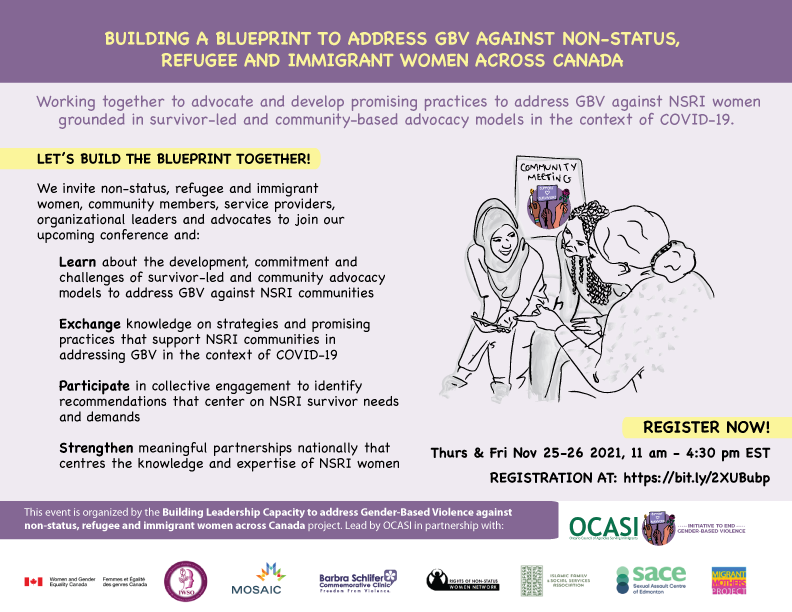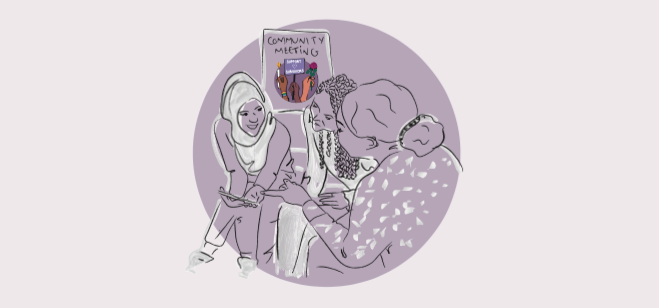
The Building Leadership Capacity Project is a five year project funded by Women and Gender Equality (WAGE) led by OCASI - Ontario Council of Agencies Serving Immigrants in partnership with civil society organizations working across not-for-profit, education, and grassroots community-based sectors to address Gender-Based Violence (GBV) in Edmonton, Fredericton, Ottawa, Toronto and Vancouver. Across the regions, we work collaboratively to develop and implement this project, with the support of Regional Partners, from settlement and/or anti-violence sector organizations and Peer Champions, who identify as non-status, refugee and immigrant (NSRI) women survivors of GBV
The primary objective of this project is to build the leadership capacity of NSRI women, as Peer Champions, to shape and inform policies and services addressing GBV. We recognize that NSRI women constitute a diverse group with intersecting identities across race, ethnicity, class, age, sexuality, gender identity, ability, etc. At the same time, there are structural barriers that NSRI women have in common, which impact their access to safety, healing, and freedom from GBV. Our approach engages NSRI women as leaders in developing solutions to GBV – solutions that address structural barriers while accounting for the diversity of NSRI women’s experiences and communities.
Partnerships and Funding:
This five year project is funded by Women and Gender Equality lead by OCASI - Ontario Council of Agencies Serving Immigrants in partnership with Barbra Schliefer Commemorative Clinic, Islamic Family and Social Services Association, Immigrant Women Services of Ottawa, The Migrant Mothers Project, MOSAIC, New Brunswick Multicultural Association, Rights of Non-Status Women Network and the Sexual Assault Centre of Edmonton.

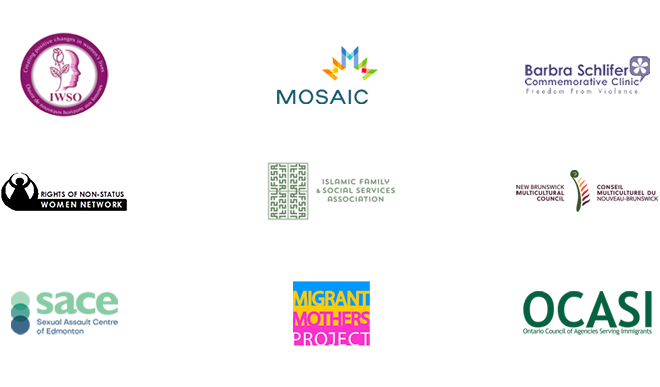
On this page:
Our Peer Champion and Community Advocacy Network (PEER-CAN) Model
The Peer-CAN model proposes a set of promising practices that support community-level capacity for enhancing the well-being of NSRI women and engaging them as leaders in eradicating GBV over the long term. We encourage the participation of NSRI survivors, service providers, and other civil society leaders to foster connections between NSRI women and participate in building community capacity for developing survivor-led, evidence-based solutions to GBV.
To build the leadership capacity of non-status, refugee and immigrant women (NSRI), our project combines two promising practices:
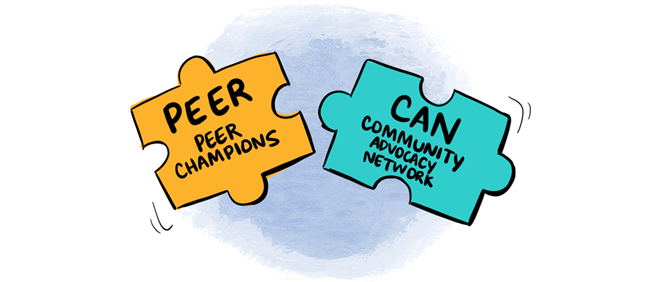
Peer Champion Network
A Peer Champions program that uses popular education to build survivor-led leadership capacity and foster connections between and among non-status, refugee and immigrant women.
Community Advocacy Network
Community Advocacy Networks (CAN) establishes grassroots networks among peer champions, NSRI survivors from the community, service providers, community advocates, and the organizations that support NSRI survivors. CANs emphasize meaningful engagement of Peer Champions and NSRI survivors in the broader community in order to build community capacity to develop survivor-led solutions to address GBV.
Our Journey: Building a Blueprint
Another aim of this project is to promote knowledge exchange and the sharing of promising practices that support NSRI survivors across regions at annual national meetings. The lessons learned and knowledge exchanged across regions will serve to build a blueprint to strengthen community capacity to address GBV against NSRI across Canada, and specifically support NSRI survivors. This blueprint is intended to capture the process of implementing survivor-led and community based practices while highlighting regional adaptations and opportunities to learn from each other.
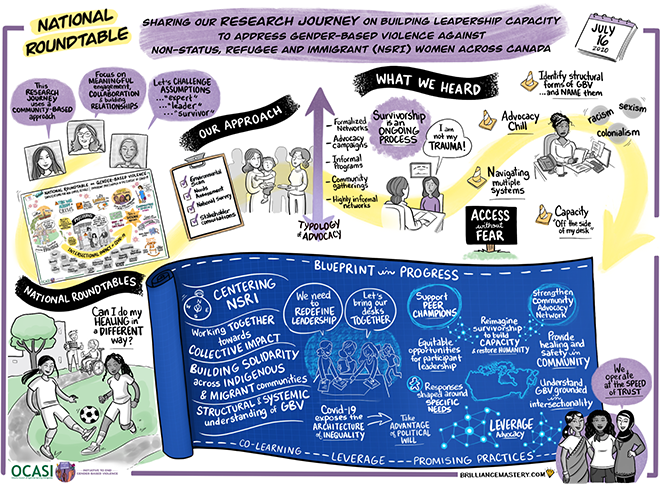
Blueprint in Progress: Knowledge Exchanges
Annual Conferences
Our project’s annual conference is an opportunity to co-learn, build shared understanding around the issues, work out ideas via conversation and arts-based activities, reflect and share on the work our project network has done together over the last year, and imagine the work we will do together over the next few years. The conference is a space to work collectively on our Blueprint in Progress to address GBV against NSRI women across Canada.
Upcoming Annual Conference
Previous Annual Conferences
2020 Conference: “Building a Blueprint to address GBV against non-status, refugee and immigrant women across Canada”
The objectives of the first annual conference (2020) were about building on this work together by:
- Building towards a national network to strengthen ongoing work addressing GBV against NSRI women
- Creating a space for collective discussion that will help inform advocacy plans at national and regional levels
- Developing meaningful relationships and partnerships to expand our collective understanding of GBV against racialized NSRI women
- Deepen our collective knowledge, responsibility, and solidarity with Indigenous communities in Canada and our initiatives to address GBV against NSRI women
Check out the summary of our first annual conference [PDF]
Roundtable Series
"Intersectional Impact of COVID-19 against NSRI women across Canada"
In 2020, our project introduced the virtual roundtable series to host conversations and exchanges that consider the differential impacts of COVID-19 for non-status, refugee and immigrant women across Canada. These webinar series work from a social justice approach that suggests that more comprehensive analysis and collective discussion of social problems will yield more effective social actions, advocacy, strategies and responses. The series brought together non-status, refugee and immigrant women, community members, frontline workers, academics, researchers, advocates and organizational leaders to share their insights, assessments and experiences around the unique tensions and challenges that COVID-19 introduces when addressing GBV against non-status, refugee and immigrant women across Canada.
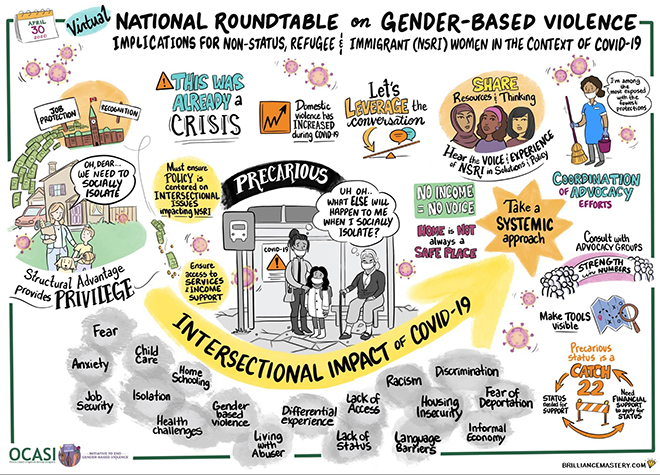
Check out the summary of this roundtable series [PDF]
Check out the roundtable series videos on our Youtube channel

